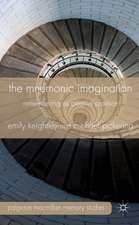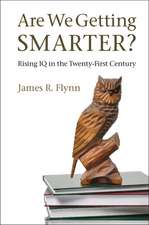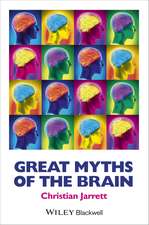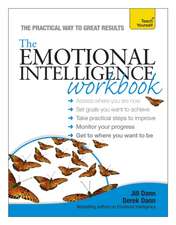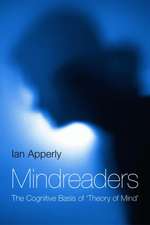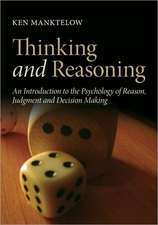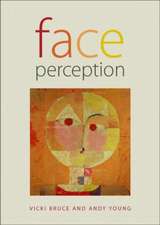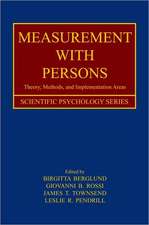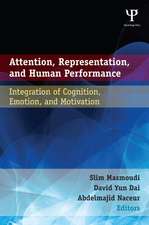Eye Guidance in Natural Scenes: A Special Issue of Visual Cognition: Special Issues of Visual Cognition
Editat de Benjamin W. Tatleren Limba Engleză Paperback – 4 feb 2019
| Toate formatele și edițiile | Preț | Express |
|---|---|---|
| Paperback (1) | 264.86 lei 6-8 săpt. | |
| Taylor & Francis – 4 feb 2019 | 264.86 lei 6-8 săpt. | |
| Hardback (1) | 681.41 lei 6-8 săpt. | |
| Taylor & Francis – 24 sep 2009 | 681.41 lei 6-8 săpt. |
Preț: 264.86 lei
Nou
Puncte Express: 397
Preț estimativ în valută:
50.69€ • 52.72$ • 41.85£
50.69€ • 52.72$ • 41.85£
Carte tipărită la comandă
Livrare economică 14-28 aprilie
Preluare comenzi: 021 569.72.76
Specificații
ISBN-13: 9781138990869
ISBN-10: 1138990868
Pagini: 432
Dimensiuni: 156 x 234 x 25 mm
Greutate: 0.45 kg
Ediția:1
Editura: Taylor & Francis
Colecția Psychology Press
Seria Special Issues of Visual Cognition
Locul publicării:Oxford, United Kingdom
ISBN-10: 1138990868
Pagini: 432
Dimensiuni: 156 x 234 x 25 mm
Greutate: 0.45 kg
Ediția:1
Editura: Taylor & Francis
Colecția Psychology Press
Seria Special Issues of Visual Cognition
Locul publicării:Oxford, United Kingdom
Cuprins
B.W. Tatler, Current Understanding of Eye Guidance. M. DeAngelus, J.B. Pelz, Top-down Control of Eye Movements: Yarbus Revisited. G. Underwood, T. Foulsham, K. Humphrey, Saliency and Scan Patterns in the Inspection of Real-world Scenes: Eye Movements During Encoding and Recognition. M. Matsukara, J.R. Brockmole, J.M. Henderson, Overt Attentional Prioritization of New Objects and Feature Changes During Real-world Scene Viewing. B.T. Vincent, R. Baddeley, A. Correani, T. Troscianko, U. Leonards, Do We Look at Lights? Using Mixture Modelling to Distinguish Between Low- and High-level Factors in Natural Image Viewing. F. Cristino, R. Baddeley, The Nature of the Visual Representations Involved in Eye Movements When Walking Down the Street. E. Birmingham, W.F. Bischof, A. Kingstone, Get Real! Resolving the Debate About Equivalent Social Stimuli. G. Kuhn, B.W. Tatler, G. Cole, You Look Where I Look! Effect of Gaze Cues on Overt and Covert Attention in Misdirection. K. Ehinger, B. Hidalgo-Sotelo, A. Torralba, A. Oliva, Modeing Search for People in 900 Scenes: A Combined Source Model of Eye Guidance. C. Kanan, M.H. Tong, L. Zhang, G.W. Cottrell, SUN: Top-down Saliency Using Natural Statistics. G.J. Zelinsky, J. Schmidt, An Effect of Referential Scene Constraint on Search Implies Scene Segmentation. B.W. Tatler, B.T. Vincent, The Prominence of Behavioural Biases in Eye Guidance. J.M. Henderson, T.J. Smith, How Are Eye Fixation Durations Controlled during Scene Viewing? Further Evidence from a Scene Onset Delay Paradigm. T.J. Smith, J.M. Henderson, Facilitation of Return during Scene Viewing. S. Pannasch, B.M. Velichkovsky, Distractor Effect and Saccade Amplitudes: Further Evidence on Different Modes of Processing in Free Exploration of Visual Images. B. Marius ‘t Hart, J. Vockeroth, F. Schumann, K. Bartl, E. Schneider, P. König, W. Einhäuser, Gaze Allocation in Natural Stimuli: Comparing Free Exploration to Head-fixed Viewing Conditions. J.A. Droll, M.P. Eckstein, Gaze Control, Change Detection and the Selective Storage of Object Information While Walking in a Real World Environment. D.H. Ballard, M.M. Hayhoe, Modeling the Role of Task in the Control of Gaze.
Descriere
Successfully completing many forms of behaviour requires that humans look in the right place at the right time: This has generated a large volume of research aimed at understanding how the eyes are guided. This special issue demonstrates that the decision about where to look involves a large number of factors from low- to high-level constraints. New models of eye guidance are presented, and these offer converging approaches to understanding how we inspect complex scenes. Importantly, this special issue brings together evidence from a range of settings - from static scene viewing to real world environments - in order to fully assess our current understanding of eye guidance in natural scenes.














